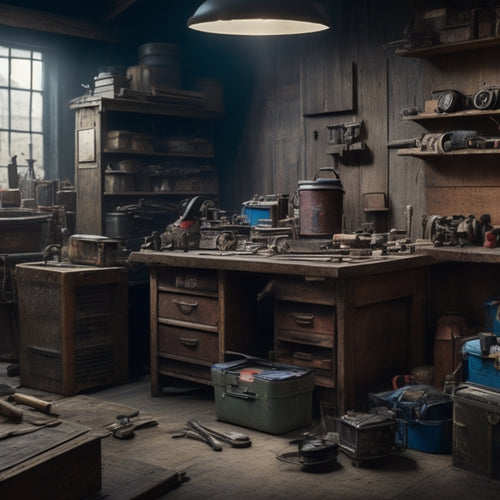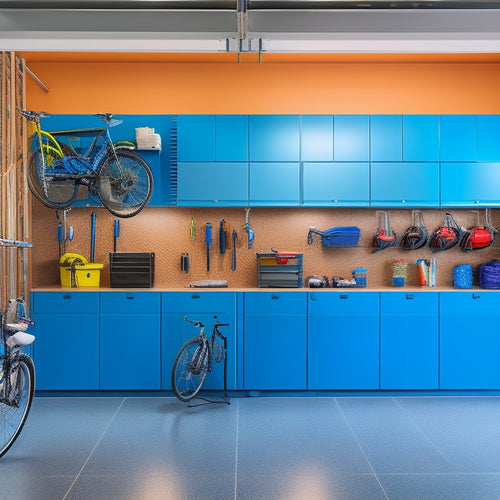
Buying the Right Industrial Storage Shelves
Share
When buying industrial storage shelves, you need to take into account your specific needs and applications to maximize floor space and efficiency. Assess the types and quantities of items you'll be storing, including dimensions, weight, and fragility, to determine the right type of shelf, such as cantilever or pallet racks, and material, like rust-resistant stainless steel. Evaluate shelf size and capacity, load capacity, and weight limits to prevent overloading and guarantee safety. By understanding these key factors, you'll be well on your way to finding the perfect shelving solution for your operation, and exploring further will reveal even more opportunities to customize and optimize your storage system.
Key Takeaways
- Determine your storage needs by assessing item dimensions, weight, and fragility to choose the right shelf type and size.
- Consider material durability, environmental conditions, and cost when selecting industrial storage shelves.
- Ensure shelves meet load capacity and weight limits to prevent structural damage or collapse, and perform regular maintenance and inspections.
- Customize shelves with adjustable features, modular systems, and accessories like bin rails and shelf dividers to maximize storage capacity and workflow efficiency.
- Look for safety features and certifications, such as clear weight capacity ratings, seismic certification, OSHA compliance, and fire-resistant materials to minimize accident risks.
Types of Industrial Storage Shelves
You'll encounter various types of industrial storage shelves, each designed to cater to specific needs and applications. Selecting the right type is essential to guarantee safety, efficiency, and productivity in your warehouse or facility.
When considering shelf aesthetics, think about the overall look and feel you want to achieve. Do you prefer a sleek, modern design or a more rugged, industrial appearance? Some shelves feature a powder-coated finish, while others have a chrome or stainless steel finish.
Installation ease is another important factor. Look for shelves with pre-drilled holes and adjustable feet for a hassle-free setup. Some shelves come with pre-assembled components, reducing assembly time and minimizing the risk of errors.
Other types of industrial storage shelves include cantilever shelves for storing long, bulky items; pallet racks for high-capacity storage; and mobile shelves for maximizing floor space.
Determining Your Storage Needs
A well-organized warehouse or facility starts with a clear understanding of your storage needs. Before selecting industrial storage shelves, you need to assess the types and quantities of items you'll be storing, as well as the available space.
Consider the dimensions, weight, and fragility of your inventory to determine the right shelf configuration and capacity. This will help you optimize shelf organization and guarantee efficient inventory management.
Take stock of your inventory and categorize items by size, frequency of use, and storage requirements. Measure the floor space and ceiling height to determine the maximum shelf size and vertical storage capacity.
You should also consider any obstacles, such as pillars or pipes, that may impact shelf placement. By gathering this information, you'll be able to determine the ideal shelf layout and configuration to meet your storage needs.
Material and Durability Considerations
With your storage needs determined, it's time to focus on the physical aspects of your industrial storage shelves. You'll want to take into account the shelf materials that can withstand the demands of your warehouse or facility.
Look for rust-resistant materials, such as stainless steel or powder-coated finishes, to guarantee your shelves can handle humid or corrosive environments.
Weight distribution is also essential to prevent collapses and guarantee safe storage. Take into account the maximum weight capacity of each shelf and how it will be distributed across the unit.
You'll also want to think about maintenance requirements, such as ease of cleaning and replacement parts availability.
Environmental factors, like temperature and exposure to chemicals, can affect the durability of your shelves. Choose shelf finishes that can withstand these conditions, and opt for assembly options that allow for easy adjustments or reconfigurations.
Lastly, take into account cost considerations, balancing durability with affordability. While it may be tempting to opt for cheaper options, remember that investing in high-quality shelves can save you money and hassle in the long run.
Shelving Unit Size and Capacity
When selecting industrial storage shelves, you'll need to evaluate the shelving unit's size and capacity to guarantee it meets your specific storage needs.
You'll want to determine the ideal shelf width and depth to accommodate your items, as well as the weight capacity limits to prevent overloading.
Additionally, you may need to assess customizable shelf sizes to optimize your storage space and maximize efficiency.
Shelf Width and Depth
Your shelving unit's width and depth determine its overall size and capacity, directly impacting the storage density and accessibility of your industrial storage shelves.
When choosing the right shelf width and depth, consider the size of the items you'll be storing and the available floor space in your warehouse or facility. A wider shelf provides more storage capacity, but may compromise shelf mobility and create narrow aisles. Conversely, a narrower shelf may limit storage capacity, but improve accessibility and shelf aesthetics.
Measure the dimensions of your items and the space available to guarantee a comfortable fit.
Consider the type of shelving system you're using, as some systems, like pallet racks, require more depth than others. Don't forget to account for any obstructions, such as pillars or overhead pipes, that may affect shelf placement.
Weight Capacity Limits
Selecting the ideal shelf width and depth is only half the battle; you must also consider the weight capacity limits of your industrial storage shelves. This is vital to guarantee the safety of your employees and the integrity of your inventory. Overloading your shelves can lead to catastrophic failures, resulting in injuries, damages, and costly downtime.
When evaluating weight capacity limits, consider the combined weight of the items you plan to store, including the weight of the containers or bins. It's important to choose shelves that can support the maximum weight capacity required for your specific application.
Be sure to check the manufacturer's specifications and certifications, such as those from the International Organization for Standardization (ISO) or the Occupational Safety and Health Administration (OSHA).
Regular shelf maintenance tips, such as inspecting shelves for damage and performing routine cleaning, can help extend the lifespan of your industrial storage shelves. Staying up-to-date with industrial shelving trends, like the use of durable materials and ergonomic design, can also help you make informed purchasing decisions.
Customizable Shelf Size
As you design your industrial storage system, customizable shelf size becomes a critical factor in optimizing your storage space and maximizing efficiency. You need shelves that can accommodate items of varying sizes and weights, without compromising stability and safety.
Modular shelving systems offer the flexibility to customize shelf size to fit your specific storage needs. This allows you to make the most of your available space, reducing congestion and improving accessibility.
When selecting shelving units, consider the shelf design trends that prioritize adaptability and adjustability. Look for systems that allow you to adjust shelf height, depth, and width to accommodate different inventory items.
This flexibility guarantees that your storage system remains efficient and effective, even as your inventory changes. By choosing customizable shelving units, you can create a storage system that adapts to your changing needs, guaranteeing safe and efficient storage operations.
Load Capacity and Weight Limits
When selecting industrial storage shelves, you need to take into account the shelf weight capacity to guarantee it can handle the intended load.
The weight limit of each shelf is vital, as exceeding it can lead to structural damage or even collapse.
You must also pay attention to load distribution, as unevenly distributed weight can put additional stress on the shelves and affect their overall capacity.
Shelf Weight Capacity
Behind every industrial storage shelf lies a critical consideration: its weight capacity. You need to verify the shelves can handle the weight of the items you plan to store. The weight capacity of a shelf is determined by its materials, design, and construction.
Shelf materials, such as steel, aluminum, or wood, have different strength and durability levels, affecting the overall weight capacity. When selecting industrial storage shelves, look for the weight capacity rating, usually specified in pounds or kilograms per shelf.
Be cautious of shelves with exaggerated weight capacity claims, as they may not be backed by load testing. Reputable manufacturers conduct rigorous load testing to determine the safe weight capacity of their shelves.
You should also consider the distribution of weight on the shelf, as uneven loading can compromise the shelf's structural integrity. Verify you understand the weight capacity of each shelf and plan your storage accordingly to prevent accidents and damage.
Load Distribution Matters
You've determined the weight capacity of your industrial storage shelves, but that's only half the battle.
Now, it's vital to take into account load distribution to guarantee your shelves remain stable and safe. Load distribution matters because uneven weight can lead to shelf collapse, even if the total weight is within the capacity.
To achieve proper load balancing, follow these guidelines:
-
Distribute weight evenly: Place heavier items near the floor and balance them with lighter items on higher shelves.
-
Avoid overhanging loads: Ascertain that items don't extend beyond the shelf's edge, as this can cause the shelf to tip or collapse.
-
Keep heavy items near the center: Heavy items should be placed near the center of the shelf, rather than near the edges, to maintain shelf stability.
- Monitor weight changes: Regularly check the weight of items on your shelves and adjust the distribution as needed to maintain a balanced load.
Customization and Accessory Options
Customizing industrial storage shelves to meet specific needs is essential for maximizing storage capacity and streamlining workflow. You can choose from various shelf design trends, including adjustable shelves, cantilever shelves, and modular shelving systems.
Modular systems, in particular, offer flexibility and scalability, allowing you to add or remove components as your storage needs change.
When selecting accessories, consider the type of items you'll be storing. For instance, if you're storing heavy bins or containers, you may want to opt for reinforced shelves or heavy-duty shelf liners.
If you're storing sensitive electronics or equipment, you might need shelves with built-in dividers or compartments to prevent damage. You can also customize your shelves with accessories like bin rails, shelf dividers, or label holders to enhance organization and visibility.
Safety Features and Certifications
Industrial storage shelves that prioritize safety features and certifications can greatly reduce the risk of accidents, injuries, and product damage.
As you evaluate your options, be certain to contemplate the following essential safety features and certifications:
-
Weight capacity ratings: Look for shelves with clearly stated weight capacity ratings to guarantee they can handle the load you need to store.
-
Seismic certification: If you're in an earthquake-prone area, choose shelves with seismic certification to confirm they can withstand tremors and earthquakes.
-
Compliance with safety regulations: Verify that the shelves comply with relevant safety regulations, such as OSHA guidelines, to minimize the risk of accidents and injuries.
- Fire-resistant materials: Opt for shelves made from fire-resistant materials to reduce the risk of fire spreading in case of an emergency.
Frequently Asked Questions
Can Industrial Storage Shelves Be Used in Humid or Outdoor Environments?
You can use industrial storage shelves in humid or outdoor environments, but you'll need to guarantee they're made from rust-resistant materials and feature moisture-proof coatings to prevent damage and guarantee safety.
Are There Any Eco-Friendly Industrial Storage Shelving Options Available?
You'll be surprised to know that 75% of consumers prefer eco-friendly products. When searching for industrial storage shelving, you'll find sustainable materials, such as reclaimed wood, and recycled options, like repurposed metal, that meet your storage needs while reducing your carbon footprint.
Can Shelves Be Easily Rearranged or Reconfigured as Needed?
You'll appreciate shelf flexibility when you need to adapt to changing storage demands; look for systems with reconfiguration options, allowing you to easily adjust shelf heights, add or remove shelves, and modify layouts without compromising safety or structural integrity.
Do Industrial Storage Shelves Come With a Warranty or Guarantee?
You'll find that many industrial storage shelves come with a warranty or guarantee, offering peace of mind; look for manufacturers that provide extensive coverage, including warranty types like limited lifetime or 10-year guarantees, which guarantee shelf durability and safety.
Are Industrial Storage Shelves Compatible With Automated Storage Systems?
You'll find that many industrial storage shelves are compatible with automated storage systems, depending on the shelf materials and load capacity; make certain the system's specifications match your shelf's weight limits and material composition for safe integration.
Conclusion
You've got the blueprint for buying the right industrial storage shelves. Now, it's time to put the puzzle pieces together. Finding the perfect shelving system is like finding the missing key to a well-oiled machine - it brings everything together, increasing efficiency and productivity. By considering the factors outlined above, you'll be well on your way to optimizing your storage space and streamlining operations.
Related Posts
-

10 Best Tool Boxes for Every Budget and Job
You're looking for a tool box that fits your budget and job requirements. Whether you're a DIY enthusiast, electricia...
-

Top 5 Small Tool Organizers for Your Workshop
You're looking to optimize your workshop's efficiency with high-quality small tool organizers. Compact storage soluti...
-

Top Garage Storage Bins for Organization and Style
You can enhance your garage's style and organization with the right storage bins. Top brands like Rubbermaid, Suncast...


